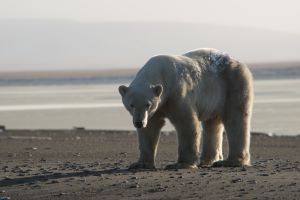Please activate JavaScript in your browser to use all interface options.
Rosneft launches environmental expedition to study polar bear population
16 August 2024-350x1000.jpg)
Rosneft Oil Company’s research expedition to study and monitor the population of polar bears in the Kara Sea has started in the Dikson settlement of the Krasnoyarsk Territory. A comprehensive aerial survey of the distribution and abundance of animals on the north-western coast of the Taymyr Peninsula during the ice-free period will be conducted for the first time.
The expedition is being organised by the Company’s Arctic Research Centre as part of the Tamura corporate programme, which has been designed with the objective of preserving the biodiversity of Arctic ecosystems. Field work will be carried out with the participation of specialists from the Severtsov Institute for Problems of Ecology and Evolution of the Russian Academy of Sciences.
A survey of the coastal territory and adjacent islands of the Kara Sea will be conducted from a helicopter with the support of RN-Vankor. The expedition participants will assess the sex and age composition of the bear population and its general condition using photo registration. Furthermore, the animals will be safely immobilised to enable scientists to take blood and hair samples for in vitro studies, including genetic analysis. This will facilitate objective evaluation of the health status of these red-listed carnivores.
Polar bears serve as bioindicators of Arctic ecosystems, and their behaviour in their natural environment provides a valuable metric for assessing the impact of climate change on Arctic nature as a whole.
 In order to monitor the seasonal migration of polar bears, their activity and feeding grounds, a number of animals will be fitted with transmitters containing satellite radio tags. In a pioneering move for Russia, plans are afoot to equip not only females, but also males, with transmitters and ear tags.
In order to monitor the seasonal migration of polar bears, their activity and feeding grounds, a number of animals will be fitted with transmitters containing satellite radio tags. In a pioneering move for Russia, plans are afoot to equip not only females, but also males, with transmitters and ear tags.
The next phase of the polar bear population study in the Kara Sea is scheduled for spring 2025. It will be conducted in conditions that are familiar to the animals, namely on landfast and drifting sea ice.
Reference:
Since 2014, Rosneft’s Arctic Research Centre has organised over 50 comprehensive expeditions in the northern seas. These expeditions have included studies of the polar bear population and other research activities.
Over the course of 120 hours of air flights, scientists recorded single creatures and groups of several animals on more than 500 occasions. Dozens of animals were examined in detail and tagged with radio transmitters, more than 500 biological samples were taken and analysed in a laboratory, and the total timing of satellite observations has now exceeded 3,000 days.
The research findings have been published in a number of leading scientific journals, as well as in the ecological atlases of the Russian seas, which Rosneft publishes in collaboration with Innopraktika.
Rosneft
Information Division
August 16, 2024

-315xx70.png)

